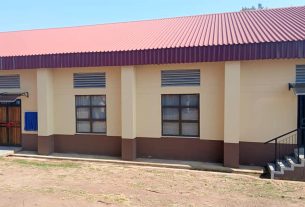BY MBONGENI NDLELA
TANZANIA – The 2025 Judicial Year of the African Court on Human and Peoples’ Rights commenced with a powerful address by Eswatini Chief Justice Bheki Maphalala, highlighting the critical need for reparations in advancing justice across the African continent.
Speaking at the high-profile event in Arusha, Tanzania, Chief Justice Maphalala stressed historical injustices that continue to afflict African societies and underscored the judiciary’s role in ensuring reparatory justice.
The event, themed “Advancing Justice Through Reparations,” brought together prominent figures, including President Jose Maria Pereira Neves of Cabo Verde, Hon. Lady Justice Imani D. Aboud, and key representatives of the African Union. Maphalala’s address resonated deeply, as he laid bare the need for Africa to address historical grievances and create pathways for justice.
 With the President of the African Court , Ambassador Mahlaba Mamba from the African Union as well as the Clerk of the Pan African Parliament.
With the President of the African Court , Ambassador Mahlaba Mamba from the African Union as well as the Clerk of the Pan African Parliament.
A History of Injustices and the Need for Redress
Maphalala traced the conversation on reparations back to the 1993 Abuja Proclamation and further reinforced its significance through international frameworks such as the 2001 Durban Declaration and the 2023 Accra Proclamation on Reparations.
He emphasized that the call for reparations is not a recent phenomenon but a long-standing demand rooted in centuries of injustices stemming from colonialism, the transatlantic slave trade, land dispossession, and the exploitation of Africa’s vast natural resources.
According to Maphalala, Africa must not shy away from confronting these injustices. Instead, the continent must embrace the momentum gathered through international resolutions and legal victories that recognize the legitimacy of reparations. The legal system, he argued, has a fundamental responsibility to ensure that these calls translate into actionable justice.
Landmark Cases and Precedents
The CJ pointed to two recent landmark decisions as milestones in Africa’s quest for justice. The 2017 ruling in the African Commission on Human and Peoples’ Rights v the Republic of Kenya (Ogiek Case) and the 2022 ruling in the Batwa Case against the Democratic Republic of Congo (DRC) were highlighted as pivotal moments in recognizing the rights of Indigenous communities.
In the Ogiek Case, the African Court ruled that the Kenyan government had violated the rights of the Ogiek people by unlawfully evicting them from their ancestral lands. Reparations were awarded, marking a major victory for indigenous land rights in Africa. Similarly, the Batwa Case saw the African Commission order reparations for the Batwa people of DRC, acknowledging the systemic injustices they endured.
“These decisions are instructive in developing models on reparations not only for indigenous populations but also for other marginalized groups affected by historical injustices,” Maphalala said.
He noted that the flexible interpretations by the African Court and the African Commission signify a growing recognition of intergenerational injustices and the necessity of adequate remedies.

With the President of the African Court of Human and People’s Rights in Arusha during the conference in Arusha
The Role of National and Regional Courts
Maphalala made a compelling argument for national judiciaries to take centre stage in the fight for reparations. He called on African courts to adopt a unified approach to addressing historical injustices, ensuring that legal frameworks accommodate collective remedies alongside individual reparations.
“The judiciary is the beacon of hope for those seeking redress,” he proclaimed, urging African courts to consider monetary and non-monetary forms of reparations, including restitution, compensation, rehabilitation, satisfaction, and guarantees of non-repetition. He further noted the complexities surrounding reparation claims, including identifying victims, establishing accountability, and determining appropriate remedies.
To tackle these challenges, Maphalala suggested that courts should explore creative and contextually appropriate solutions. He encouraged national judiciaries to develop legal precedents that balance historical redress with contemporary justice needs, ensuring that Africa’s justice system evolves to serve its people effectively.
Implementing Reparations: The Road Ahead
A key challenge raised in the CJ’s address was the implementation of reparations. While judicial rulings on reparations are crucial, enforcement remains a significant hurdle. Maphalala stressed that African states must demonstrate commitment to these rulings, providing financial and institutional support to ensure that reparations translate into tangible benefits for affected communities.
“Reparations are not merely about financial compensation; they are about restoring dignity, identity, and opportunity to those who have suffered historical wrongs,” he stated. He called for greater collaboration between governments, civil society, and international organizations to facilitate the effective implementation of reparatory justice.
The Chief Justice also highlighted the need for policy frameworks that recognize the diverse forms of reparations. He suggested that governments establish commissions to oversee reparation claims and ensure that judicial rulings are respected. Additionally, he called for continued dialogue and knowledge exchange among African courts to build a strong jurisprudence on reparations.
A Unified African Approach to Justice
In closing, Chief Justice Maphalala reiterated the importance of African unity in advancing justice through reparations. He noted that the continent stands at a critical juncture, where legal institutions can redefine the trajectory of justice by addressing the historical wounds that continue to impact African societies.
“As national judiciaries, we join hands with all participants to contribute to the discourse on our shared responsibility to advance justice through reparations,” he concluded. His words served as both a call to action and a message of hope, affirming the judiciary’s role as a custodian of justice for all Africans.
As the African Court embarks on another judicial year, Maphalala’s speech sets the stage for meaningful engagements on reparatory justice. His address challenges Africa’s legal institutions to move beyond rhetoric and ensure that justice is not just an ideal but a reality for those who have long suffered historical injustices. With landmark cases setting precedents and growing momentum towards reparations, the coming years could see significant strides in achieving justice for the continent’s marginalized communities.



